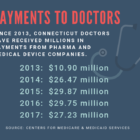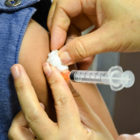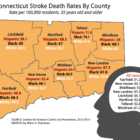I-Team In-Depth
Pharma Cash Flows To Doctors For Consultant Work Despite Scrutiny
|
With physicians’ compensation from pharmaceutical and medical device companies under increasing scrutiny, payments to doctors in Connecticut for consultant work rose to $8.5 million in 2017, up from $8 million in 2016. Payments for meals, travel and gifts also increased from $3.2 million in 2016 to $3.5 million in 2017, data from the Centers for Medicare & Medicaid Services show. Of the total $27.2 million in payments, $4.37 million – or 16 percent – went to 10 doctors holding licenses in Connecticut. The highest paid doctor was Dr. Paul Sethi, an orthopedic surgeon in Greenwich, who accepted slightly more than $1 million in 2017 in royalty fees, consulting work, and other services from several companies, including Arthrex Inc., and Pacira Pharmaceuticals Inc., maker of Exparel. The drug, Exparel, is marketed as an alternative to opioid painkillers post-surgery.







